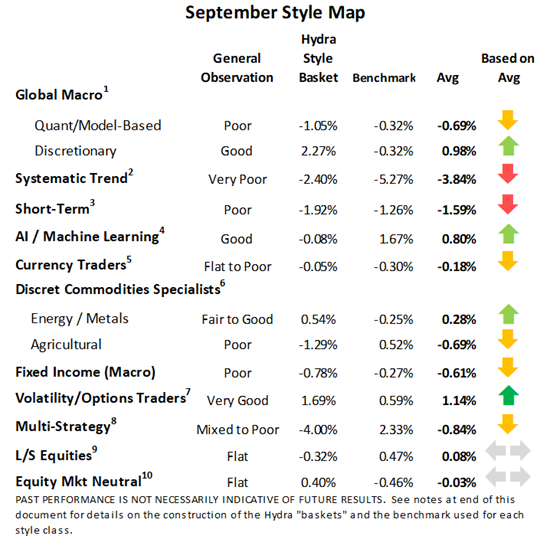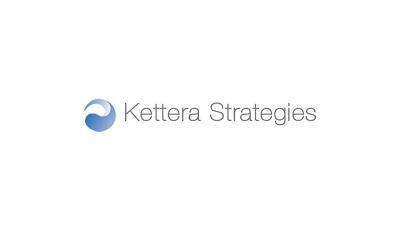Kettera Strategies Heat Map - September 2019
In global macro, with some notable exceptions, we noted once again a divergence between discretionary and quant/model-driven macro programs. Most discretionary strategies appeared to have a good month, particularly those with short North American fixed income positions. Macro programs with commodities exposure also seemed to fare better than others.
While quant macro strategies generally seemed to not perform as well as discretionary, models that stuck to fundamental inputs seemed to navigate the markets the best. Those with any systematic trend elements encountered more problems – especially with the retreat in bonds in the month’s first half.
Trend following strategies finally had a correction month, with many (but not all) programs surrendering roughly one-fifth to one-quarter of their YTD returns. The leading source of losses across the board was fixed income, where traders’ models found themselves on the wrong side of the bond retreat. Some rare bright lights included non-US equities indices, and some programs capitalized in FX as well, but these were typically not enough to stem the tide.
Short-term and higher-frequency programs, which had enjoyed a solid 2019 so far, also underwent a giveback month. The losing sectors were largely the same as those for trend programs above (fixed income being the most challenging). Most agricultural commodities specialists we follow seemed to have a good month; many traders capitalized on long positions in soybeans and hogs, as well as seasonal corn spreads.
Currency specialists put in a generally uneventful month, as most exchange rates were choppy and sideways in September, and carry programs did not have much to offer.
The performance of the various equities-based strategies we’ve been focusing on – both L/S equities programs and market neutral strategies – appeared to differ so greatly it is difficult to generalize on a theme. Overall we did not witness too many substantially negative numbers, as most were flat to positive.

**********
For the “style classes” and “baskets” presented in this letter: The “style baskets” referenced above were created by Kettera for research purposes to track the category and are classifications drawn by Kettera Strategies in their review of programs on and for the Hydra Platform. The arrows represent the style basket’s overall performance for the month (e.g. the sideways arrow indicates that the basket was largely flat overall, a solid red down arrow indicates the basket (on average) was largely negative compared to most months, etc.). The “style basket” for a class is created from monthly returns (net of fees) of programs that are either: programs currently or formerly on Hydra; or under review with an expectation of being added to Hydra. The weighting of a program in a basket depends upon into which of these three groups the program falls. Style baskets are not investible products or index products being offered to investors. They are meant purely for analysis and comparison purposes. These also were not created to stimulate interest in any underlying or associated program. Nonetheless, as these research tools may be regarded to be “hypothetical” combinations of managers, hypothetical performance results have many inherent limitations, some of which are described below. No representation is being made that any product or account will achieve profits or losses similar to those shown. In fact, there are frequently sharp differences between hypothetical performance results and the actual results subsequently achieved by any particular trading program. One of the limitations of hypothetical results is that they are generally prepared with the benefit of hindsight. In addition, hypothetical trading does not involve financial risk, and no hypothetical trading record can completely account for the impact of financial risk in actual trading. There are numerous other factors related to the markets in general or to the implementation of any specific trading program which cannot be fully accounted for in the preparation of hypothetical performance results and all of which can adversely affect actual trading results.
Benchmark sources:
1-The Hedge Fund Intelligence Global Macro Index and HFI Currency Index
2-The Societe Generale Trend Index and SG CTA Index
3-The Societe General Short-term Traders Index: (same link as above)
4-The EurekaHedge AI Hedge Fund Index
5-The BarclayHedge Currency Traders Index and BTOP FX Traders Index
6- S&P GSCI Metals & Energy Index and S&P GSCI Ag Commodities Index
7-The CBOE Eurekahedge Relative Value Volatility Hedge Fund Index
8-The Eurekahedge-Mizuho Multi-Strategy Index: (See above)
9-The Eurekahedge Long Short Equities Hedge Fund Index: (See above)
10-Blend of BarclayHedge Equity Market Neutral Index with Eurekahedge Equity Mkt Neutral Index (see link above)
Indices and other financial benchmarks shown are provided for illustrative purposes only, are unmanaged, reflect reinvestment of income and dividends and do not reflect the impact of advisory fees. Index data is reported as of date of publication and may be a month-to-date estimate if all underlying components have not yet reported. The index providers may update their reported performance from time to time. Kettera disclaims any obligation to verify these numbers or to update or revise the performance numbers.
***
The views expressed in this article are those of the author and do not necessarily reflect the views of AlphaWeek or its publisher, The Sortino Group
© The Sortino Group Ltd
All Rights Reserved. No part of this publication may be reproduced, stored in a retrieval system or transmitted in any form or by any means, electronic, mechanical, photocopying, recording or scanning or otherwise, except under the terms of the Copyright, Designs and Patents Act 1988 or under the terms of a licence issued by the Copyright Licensing Agency or other Reprographic Rights Organisation, without the written permission of the publisher. For more information about reprints from AlphaWeek, click here.








